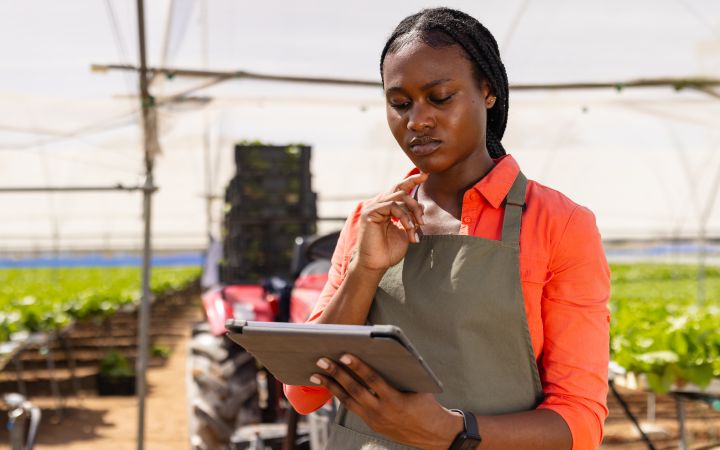- UNITAR and the Food and Agriculture Organization of the United Nations (FAO) launched the third edition of the online training course "Trade and Food Security for the Near East and North Africa", which will run from 6 October to 2 November 2024.
- UNITAR and FAO will train 70 officials from government bodies, private sector stakeholders, researchers and students from Arabic-speaking countries.
- In this 4-week free online course, learners will learn how to formulate and implement evidence-based trade policies and negotiate trade agreements to address food security concerns, so they can contribute to their countries' economic growth and structural transformations.
7 October 2024, Geneva - The United Nations Institute for Training and Research (UNITAR) and the Regional Office for the Near East and North Africa of the Food and Agriculture Organization of the United Nations (FAO) jointly launched the third edition of the online training course "Trade and Food Security for the Near East and North Africa (NENA)", which aims to strengthen government capacity to develop and implement trade policies and negotiate trade agreements. The course will run from 6 October to 2 November 2024, facilitated by experts and delivered in Arabic.
This third edition is offered in response to the large demand from the region following the first-course launch in October 2021. Participants will learn to develop and implement evidence-based trade policies and negotiate trade agreements, taking into consideration their needs for economic growth and structural transformation, as well as their food security concerns.
In preparing the course content, which was revised thoroughly in 2023, FAO drew from its extensive experience in providing guidance, capacity-building and technical advice to its member countries on trade and food security, agricultural trade policy and multilateral trade negotiations, as well as its normative work on the sanitary and phytosanitary issues.
This course is offered free of charge as part of FAO's support to member countries in the NENA region. It will be delivered via UNITAR's e-learning platform and supported by the UNITAR learning team. A UNITAR-FAO Certificate of Completion will be issued to participants who complete all course-related assignments and assessments.
Intended Audience
The Trade and Food Security course is designed for government officials who are directly involved in the formulation and implementation of agricultural policies and programmes in Arabic-speaking countries in the NENA region. Participants may come from ministries of agriculture, livestock and fisheries; ministries of trade, commerce and industry; ministries of finance, economy; and food safety, sanitary, phytosanitary, veterinary, and other authorities.
The programme aims to train 70 officials who were selected by FAO from the over 400 applications received. The geographical and institutional distribution of the participants were considered, as well as gender balance.
Food Security in the Near East and North Africa (NENA) Region
The relationship between trade and food security is attracting increased attention on both the trade and the development agendas. The eradication of global hunger by 2030 is a key goal in the 2030 Agenda for Sustainable Development, and trade is recognized as one of the means to achieving the Sustainable Development Goals.
The challenge is how to ensure that the expansion of agricultural trade works for and not against, the elimination of hunger, food insecurity and malnutrition. This challenge has been at the forefront as governments struggle to negotiate the changes to the current global agreements on agricultural trade that are needed to ensure that trade results in enhanced food security.
The region faces an increasing need for trade experts who can support the trade-related development agenda in the region. Often, national and regional institutions do not have the technical capacity or resources to map out national, subregional and regional trade priorities and constraints; to empirically assess the implications of their multiple memberships on trade and food security; to formulate appropriate mitigation policies and strategies; or to negotiate trade agreements that boost gains from trade and specialization.
Feedback from the Past Courses
Previous versions of this UNITAR-FAO joint course were well received, with the most recent version offered in 2023. Participants stated that they found the methodology effective for learning, appreciating the well-planned, easy-to-follow approach and peer learning opportunities. Mentors encouraged active participation and interaction, creating a positive atmosphere. Overall, participants found the course relevant to their jobs, intended to apply their learning, and would recommend it to colleagues as a valuable experience.
This course served as a methodology and road map for everyone who wants to assess the situation in their country and solve the accumulated problems in most Arab countries." - Ibrahim
You will see me apply the knowledge of this course in my day-to-day work, as well as sharing them with my colleagues for better work." - Mariam.
This will support my professional capabilities, especially in my position as head of department in the Ministry of Agriculture and as a specialist in agricultural economics. The economic situation has recently known instability in food prices, which requires us to take urgent measures, and therefore this course enhanced our awareness of multiple concepts related to the means and measures that can mitigate the impact of market changes and scarcity of foodstuffs." - Said.
See more impact stories from the Trade and Food Security course.
About the FAO-UNITAR Partnership
UNITAR and the FAO have a longstanding collaboration that aims to expand access to education and training in order to strengthen the capacities of stakeholders. The two organizations have jointly implemented training activities on a wide range of topics since 2010.
The partnership builds upon the strengths of both institutions by transforming the knowledge expertise of the FAO into high-quality learning products and services, making use of UNITAR's training expertise. The programmes are designed to transfer knowledge, impart skills and raise awareness, taking full advantage of modern information and communication technology for greater outreach and cost-effectiveness.
About UNITAR
The United Nations Institute for Training and Research (UNITAR) is a dedicated training arm of the United Nations. In 2023, UNITAR trained over 500,000 learners around the world to support their actions for a better future. UNITAR has a global presence, with offices in Geneva, Hiroshima, New York and Bonn and networks around the world.








